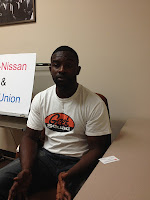On the evening of March 18, 1968, Martin Luther King Jr. addressed striking sanitation workers in Memphis, and this is what he told them:
“All labor has worth. … Don’t despair. Nothing worthwhile is
gained without sacrifice. The thing for you to do is stay together. … Let it be
known everywhere that along with wages and all of the other securities that you
are struggling for, you’re also struggling for the right to be organized and be
recognized.”
Seventeen days later, King was assassinated on the balcony
of the Lorraine Hotel in downtown Memphis.
(To the right, A. Philip Randolph)
The next year, a great leader of both the civil rights and labor movements, Brotherhood of Sleeping Car Porters founder A. Philip Randolph, had this to say: “The labor movement has been the home of the working man, and traditionally, it has been the only haven for the dispossessed; and therefore, I have tried to build an alliance between the Negro and the American labor movement.”
The next year, a great leader of both the civil rights and labor movements, Brotherhood of Sleeping Car Porters founder A. Philip Randolph, had this to say: “The labor movement has been the home of the working man, and traditionally, it has been the only haven for the dispossessed; and therefore, I have tried to build an alliance between the Negro and the American labor movement.”
Josh Dedmond, Monica Atkins and Tyson Jackson are wanting to
build on the alliance King, Randolph and others envisioned four decades ago.
They believe labor and workers’ rights can be the civil rights movement of
today.
That’s why they and other Jackson, Miss.-area members of the newly
formed Mississippi Student Justice Alliance are planning an “I Am” labor-and-civil
rights conference in Jackson in late November. The conference is named
after the “I Am A Man” sign sanitation workers carried in Memphis. The Jackson
conference will feature veterans of that 1968 strike.
“This is in the same vein as the Student Nonviolent
Coordinating Committee," says Dedmond, 25, a recent Tougaloo College graduate in
African-American and religious studies. SNCC played a key role in the civil
rights movement. “There is an enormous power in students regarding social
justice issues. The two movements are inextricable from one another.”
The Mississippi Student Justice Alliance’s target: helping workers
at the giant Nissan plant in Canton, Miss., realize their goal of joining the
United Auto Workers despite management’s disdain for that idea.
Dedmond, Atkins and Tyson are also now working with the UAW
and its Global Organizing Institute, helping recruit and educate young people
from around the world about labor issues.
“We started figuring out about the workers at Nissan and how
they wanted a fair election process,” said Atkins, 23, a Chicago native who
graduated from Jackson State University in April. She said she decided to stay
in Mississippi after graduation because “here there is a lot more opportunity
to make a difference.
Making a difference in Mississippi can be an uphill fight.
King and Randolph would be the first to tell them.
At the Nissan plant, pro-UAW workers not only face an
anti-union CEO in Carlos Ghosn but also a conservative state with a
union-hostile “right-to-work” law embedded in its constitution, a
Republican-led legislature and a Republican governor who has publicly expressed
support for outside groups that would help fight a union at Nissan or Toyota
in Mississippi.
What the striking workers in Memphis sought in 1968 “is
exactly what the Nissan workers are asking for,” says Jackson, 31, who studies
political science at Tougaloo. “That is respect.”
(To the right, Tyson Jackson at the UAW office in Canton, Miss.)
The UAW has laid the foundation for an all-out organization
effort at the 3,300-worker plant. A community network that includes U.S. Rep.
Bennie Thompson, D-Miss., area ministers and civil rights-era veterans and
activists has pledged to assist in the union’s call for an election free of
intimidation.
Mississippi’s rich civil rights history was a factor in the
UAW’s decision to take a stand in Canton. In the early 1960s, state NAACP
leader and civil rights martyr Medgar Evers worked hand-in-hand with state
AFL-CIO leaders Claude Ramsay, Thomas Knight and Ray Smithhart. Like other
labor leaders in the South, they endured many defections of white members from
their ranks as a result of their stand for civil rights.
Most of the workforce at the Nissan plant in Canton is
African-American. They make some of the best wages in a state that perennially
ranks at the nation’s bottom in wage earnings. However, workers complain that
they haven’t had a pay raise in years, have little or no say-so regarding
working conditions, and face a constant barrage of anti-union propaganda.
Federal law guarantees that workers have the right to
organize and join a union without harassment. The truth is, however, workers
across America now face the kind of hostility that Mississippians have known
since segregationist Gov. Ross Barnett secured “right to work” as state
law. They get little or no backing from Congress
or the U.S. “Corporate” Supreme Court, and even some major Democrats like
Chicago Mayor Rahm Emanuel seem antagonistic to unions.
If there’s to be a resurrection of the labor movement, the
UAW seems poised to play the kind of pivotal role it played both in past labor
and civil rights history. Its sit-down strikes (a tactic later embraced by
civil rights activists) in the 1930s helped establish modern-day labor. In the
1960s, UAW leader Walter Reuther marched alongside Martin Luther King Jr.
“When (police commissioner) Bull Connor is destroying
freedom in Birmingham, he is destroying my freedom in Detroit,” Reuther said
during the famous March on Washington in August 1963.
That’s the spirit—along with those of King and Randolph—that
Redmond, Atkins and Jackson are hoping to rekindle in Mississippi.



